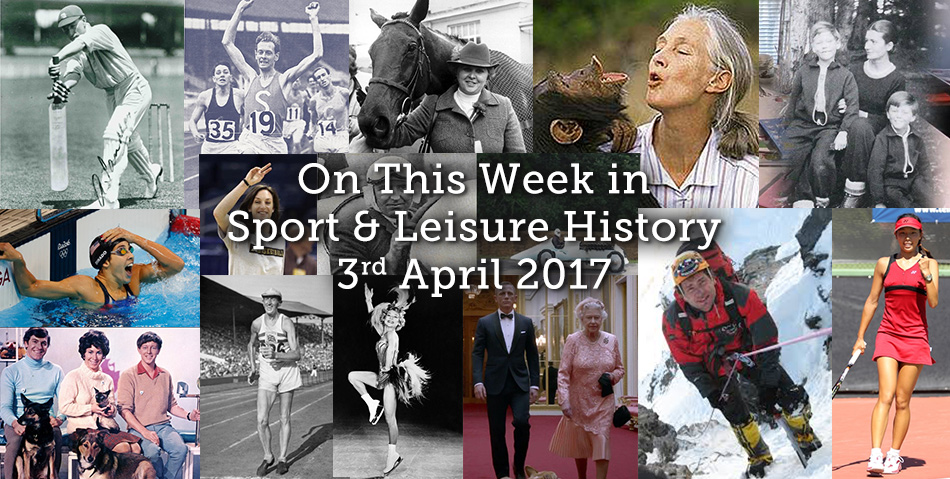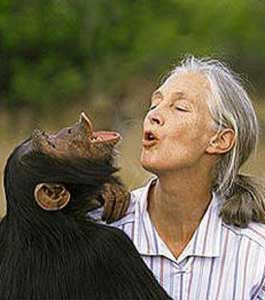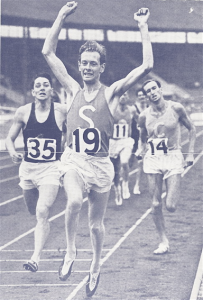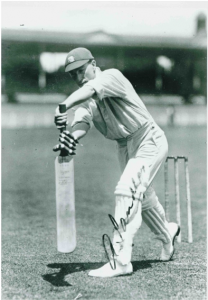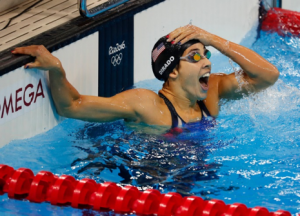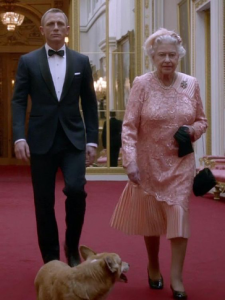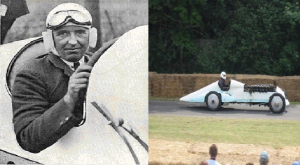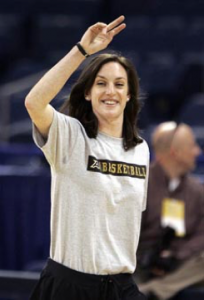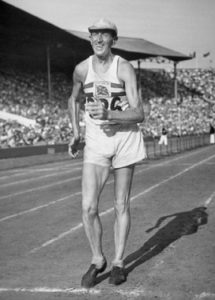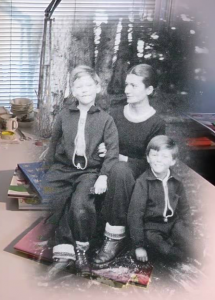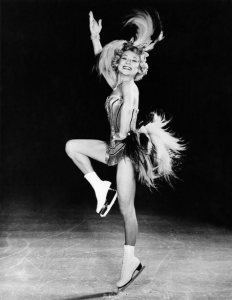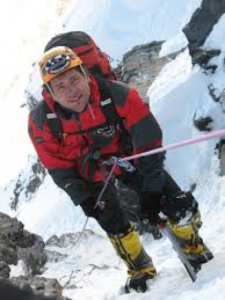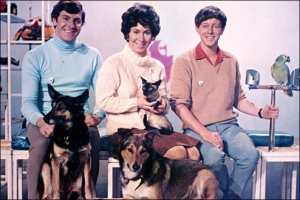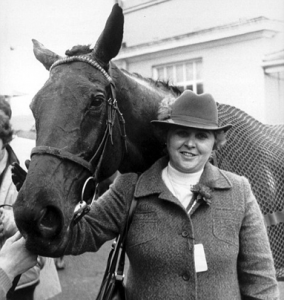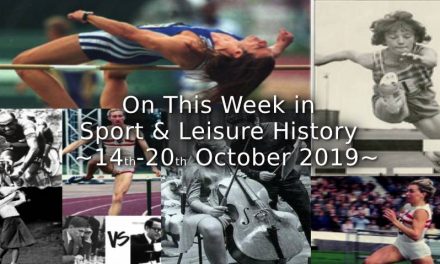3rd – On this day in 1908 the heavyweight wrestling championship was won by Frank Gotch after a bout that lasted 2 hours. Estonian George Hackenschmidt met the American Gotch at the Dexter Park Pavilion in Chicago. After avoiding Gotch’s challenges for some time and furthermore showing his contempt for Gotch and for American wrestling in general, Hackenschmidt was not in the best condition for the match, unlike Gotch, who used his speed, defence and rough tactics to wear Hackenschmidt down and then assume the attack. The wrestlers stood on their feet for two full hours before Gotch was able to get behind Hackenschmidt and take him down. While on their feet, Gotch made sure to lean on Hackenschmidt to wear him down. He bullied him around the ring, and his thumbing and butting left Hackenschmidt covered in blood. Hackenschmidt complained to the referee of Gotch’s foul tactics and asked that Gotch be forced to take a hot shower to rid his body of an abundance of oil, but the referee ignored the complaints and told Hackenschmidt he should have noticed the oil before the match began. The match continued until the two-hour mark, when Hackenschmidt was forced against the ropes. Gotch tore him off the ropes, threw Hackenschmidt down and for three minutes held him, working for his dreaded toe hold. Hackenschmidt had trained to avoid this hold, which he did, but the effort took his last remaining strength. Hackenschmidt quit the fall. “I surrender the championship of the world to Mr. Gotch”, he said, and stood up and shook Gotch’s hand. The wrestlers then retired to their dressing rooms before coming out for the second fall, but Hackenschmidt refused to return to the ring, telling the referee to declare Gotch the winner, thereby relinquishing his title to him. Dame Jane Goodall was born in 1934, formerly Baroness Jane van Lawick-Goodall, she is a British primatologist, ethologist, anthropologist, and UN Messenger of Peace. Considered to be the world’s foremost expert on chimpanzees, Goodall is best known for her 55-year study of social and family interactions of wild chimpanzees in Gombe Stream National Park, Tanzania. She is the founder of the Jane Goodall Institute and the Roots & Shoots programme, and she has worked extensively on conservation and animal welfare issues. She has served on the board of the Nonhuman Rights Project since its founding in 1996. Oxford won the 100th Boat Race on this day in 1954. In rough conditions on the River Thames, he victorious Dark Blues beat Cambridge by four-and-a-half lengths despite windy conditions and choppy waters along the four-and-a-quarter mile (6.84km) course from Putney to Mortlake. The Dark Blues had won the race just 11 times in the previous 38 races, clocked a winning time of 20 minutes, 23 seconds. The Oxford team began the race in the lead despite a lighter average weight than their rivals (12st 4lbs vs 12st 11lbs). They had won the toss and chose to start the race from the Surrey station with Cambridge setting off from the Middlesex station. It was a close contest until about half way through the race when Oxford surged ahead. The increasingly rough weather conditions did nothing to dampen the Oxford crew’s quest for victory. By the time the Dark Blues reached the Chiswick steps they were 11 seconds ahead and the result of the race already seemed in little doubt. For a fleeting moment, off Duke’s Meadows, it looked as if Cambridge might make a last dash for victory but Oxford kept them at bay. Oxford crossed the finish line at 34 strokes per minute after averaging an impressive 30 throughout the race. British athletics favourite Martyn Rooney was born in 1987, specialising in the 400m, he reached the final at the 2008 Olympics and won bronze in the 4×400m relay. A mainstay on the anchor leg of the Great Britain 4 x 400m relay team, at the 2009 World Athletics Championships he won silver with the Great Britain relay team, and bronze in the 2015 championships. His personal best time is 44.45s. Today in 1992 Russian Olympic swimmer Yuliya Yefimova was born. A three-time Olympian, she made her Olympic debut in 2008, before going on to win bronze in the 200m breaststroke in 2012, and silver in the 100m and 200m breaststroke in 2016. Yefimova is a four-time World Champion, winning the 50m breaststroke at the 2009 World Championships, the 50m and 200m breaststroke in 2013, and the 100m breaststroke in 2015. She is a former world record holder in the 50m breaststroke. In 2013, she failed a drugs test and was suspended from competition for 16 months, she also tested positive for meldonium in 2016, but this was later overturned. The Grand National ended in chaos today in 1993 after a series of events at the start which reduced the world-famous horse race to a shambles. An estimated 300 million people around the world were watching the race, held at the Aintree racecourse in Liverpool, live on television, when 30 of the 39 riders failed to realise a false start had been called and set off around the racetrack. The Jockey Club was forced to declare the race void after several riders completed both laps of the gruelling 30-obstacle course and passed the finish line before they realised their mistake. The Jockey Club decided not to re-run the race, and as a result it has often been called the race that never was. Bookmakers were forced to refund an estimated £75 million in bets staked. The Jockey Club launched an inquiry which led to a number of changes in the starting and recall procedures for future races. The disastrous sequence of events began seconds before the race was due to start, when protesters got onto the track near the first fence. They were spotted, and after a delay, the race officials asked horses and riders to line up again. Then there were two false starts caused by horses getting tangled up with the starting tape. On the second false start, the recall flag, which signals riders to pull up once they have started, was not waved, and all but nine riders raced away. The recall man, Ken Evans, was interviewed by stewards to find out why he did not wave his flag. The crowd shouted frantically at the jockeys to get them to stop, and officials tried desperately to flag them down from the side of the track, but without success. In the end, 11 riders completed the first circuit before pulling up, and seven never realised anything was wrong, racing right to the finish line in the four-and-a-half-mile (7 km) race. Esha Ness, a 50-1 outsider trained by Jenny Pitman and ridden by John White, crossed the line first. “I could see there were only a few horses around, but I thought the others had fallen or something,” White said after the race. Mrs Pitman, who became the first woman to train a first Grand National winner in 1983 with Corbiere, was devastated. “This is no Grand National, even though I have won it,” she said. Japanese tennis player Mayo Hibi was born today in 1996. She has won four singles titles on the ITF tour in her career. On June 20, 2016, she reached her best singles ranking of world number 166. On May 26, 2014, she peaked at world number 378 in the doubles rankings. Hibi won her first $50,000 ITF tournament at the 2013 FSP Gold River Women’s Challenger, defeating Madison Brengle in straight sets in the final. She has been living in California since the age of 2.
- Dame Jane Goodhall
- Mayo Hibi
4th – In 1892 West Bromwich Albion beat Darwen 12-0 to record the biggest win in the first division of the Football League. The result was equalled by Nottingham Forest in 1909 when they beat Leicester Fosse by the same margin. In 1930 Andrew Sandham became the first man to score 300 runs in an innings in Test Cricket. His total of 325 was compiled for England against the West Indies at Kingston, Jamaica during the first Test series hosted in the West Indies. The former world heavyweight boxing champion Ernie Terrell was born in 1939. He is the tallest world heavyweight champion at 6ft 6in (1.98m), although some boxing experts list Jess Willard as having ¼ inch on Terrell. Brian Hewson, British track and field athlete was born today in 1933. He represented Great Britain at two consecutive Summer Olympics (1956) in the 1500m and (1960) in the 800m. He won gold in the 1500m at the 1958 European Championships in Stockholm, Sweden. Hewson was one of the first men to run a four-minute mile, clocking 3:59.8 at the White City Stadium in London on 28 May 1955. As he placed third to László Tábori and Chris Chataway, he became the first to run a mile in less than four minutes and not finish in the top two; before that race, only Roger Bannister and John Landy had run a four-minute mile. Richard Attwood British motor-racing driver was born on this day in 1940. During his career he raced for the BRM, Lotus and Cooper Formula One teams. He competed in 17 World Championship Grands Prix, achieved one podium and scored a total of 11 championship points. He was also a successful sports car racing driver and won the 1970 24 Hours of Le Mans race, driving a Porsche 917. Today in 1964 The Beatles occupied the top five positions on the Billboard Hot 100 pop chart. On this day in 1981 an emotional moment in the sporting history occurred at Aintree as Bob Champion won the Grand National on Aldaniti. Champion had been given only months to live after cancer was diagnosed in 1979. Against the odds he beat the disease and so became the most celebrated Grand National winner in recent times. His mount, Aldaniti , was also a survivor, having overcome tendon trouble and a broken hock bone. On the same day that Champion was winning the National in 1981, Susan Brown was writing her name in the record books as the first women to compete in the University Boat Race. She coxed the Oxford Crew to an eight lengths victory over Cambridge. American sprinter Barney Ewell died on this day in 1996. Born into poverty in Harrisburg, Pennsylvania, Barney Ewell was one of the world’s leading sprinters of the 1940s. He was the state’s greatest high school sprinter-jumper in the mid-1930s, but he first achieved renown while a student at Pennsylvania State University, running the 100m and 200m races and winning 12 gold medals and championships in collegiate meets between 1940 and 1942. He also won 11 gold medals in AAU national meets between 1939 and 1948. He was an outstanding long jumper as well, leaping 25 feet 2 inches (7.68 m) in 1942. He served his country during the years 1941-1945, returned to the university and received his BS degree in 1947. He surprised everyone by making the 1948 Olympic team, equalling the world record of 10.2 in the 100m dash at the 1948 AAU championship, which was doubling as the Olympic trials. At the Olympic Games in London, he thought he had won the 100m only to learn the victory was given to teammate Harrison Dillard. In the 200m, Ewell had another close finish and again finished second – this time to teammate Mel Patton. He was added to the 4×100m relay when Ed Conwell became sick and the American team rolled to an easy victory. However, the exchange between Ewell and Lorenzo Wright was ruled out of bounds and the American team was disqualified. After viewing a film of the race, however, officials reversed the ruling, and Barney Ewell finally had his Olympic gold medal. Barney Ewell took part in the Scottish Border games circuit during the summer of 1950. He lived most of those weeks in the town of Bathgate. He won one of the most prestigious sprints on the Border Games circuit at Jedburgh. Running off scratch over 120 yards he ran a time of 11.37 secs. He also took part in a special invitation race in August that same year to mark his time in Scotland (run as a handicap race) over 120 yards at the famous Powderhall venue. Barney from the scratch mark lost narrowly to Albert C Charles (off 12.5 yds). On this day in 2011 a record $79million at auction was paid for Chinese contemporary artist Zhang Xiaogang’s 1988 ‘Forever Lasting Love’, a three-panel oil painting. In 2012 Somalia’s National Theatre was struck by a suicide bomber killing ten people including the presidents of the Somali Olympic Committee and Football Federation.
- Andrew Sandham
5th – John Wisden, the man who devised the famous Wisden Cricketers’ Almanack, died on this day in 1884. The first edition was published 1864. It contained 116 pages and cost one shilling (5p). Brigadier General Arnold Nugent Strode Strode-Jackson, was born today in 1891. He was a British athlete, British Army officer, and a barrister. Jackson rowed and played football and hockey for Brasenose College, was captain of the hockey team, won the mile race for Oxford against Cambridge three times and was President of the Oxford University Athletic Club. In 1912, while still an undergraduate, Jackson cut short his fishing holiday in Norway, and travelled by train to compete in that year’s Olympic Games in Sweden. He had to compete as a private entry, not having been chosen by the Great Britain team selectors, along with his friend from Cambridge, Philip Baker, another private entry. This was the last Olympics at which such private entries were allowed. Even when compared to the amateurish race preparation of the era, Jackson’s training regime of massage, golf and walking seemed very relaxed. At Stockholm, American hopes were high to win gold in 1500m, as the USA dominated mile racing at that time, and seven of the runners in the final were from the USA. The race started at a modest 65-second-pace, until Norman Taber from USA took the lead and increased the pace. At the bell for the final lap, American Abel Kiviat, a world record holder in 1500m, was leading, followed by Taber and John Paul Jones, the mile world record holder from the US. On the final turn, Mel Sheppard and Jackson also joined the crowd on his heels, with Sweden’s Ernst Wide closing fast. The three Americans ran abreast in an attempt to stop anyone from overtaking, so Jackson had to run wide. With 50 yards left, Jackson came even with Kiviat and Taber, as Jones and Wide started to fade. Jackson summoned one last burst and captured the gold in 3:56.8, an Olympic record. Kiviat and Taber both clocked 3:56.9, and the photo had to be reviewed before officials handed the silver to Kiviat. Baker finished sixth. At the time, it was widely acclaimed as being “the greatest race ever run”. Aged 21, Jackson was the youngest ever Olympic 1500m gold medallist until Asbel Kiprop in 2008, aged 19. During the Scotland versus England match at Ibrox in 1902 part of a temporary wooden stand collapsed, killing 25 people and injuring hundreds more. A second tragedy struck the ground in 1971. Today in 1904 the first International Rugby League match was played between England and an Other Nationalities team (made up of Welsh and Scottish players), in Central Park, Wigan. Another British Olympian was born on this day, in 1912 – Bill Roberts. At the 1934 British Empire Games, Roberts finished second in 440yds behind Godfrey Rampling, but turned the silver into gold at the next British Empire Games in 1938 in Sydney, Australia. He also won silver in 4x440yds relay and finished sixth in the 220yds. At the Berlin Olympics, Roberts just missed the medals in the individual 400m, finishing fourth in the final, and ran the third leg in the gold medal winning British 4x400m relay team. After World War II and service in the RAF, Roberts returned to athletics to win silver as a member of British 4x400m relay team at the 1946 European Championships. At the 1948 Olympics, Roberts was chosen as Great Britain’s athletics team captain, he was eliminated in the heats of the 400m and anchored the British relay team to a fourth place in their heat of the 4×400m. After his retirement from athletics in 1949, he worked as a columnist for the Manchester Evening News. Bill died in Timperley, Manchester, aged 89. The first black world heavyweight boxing champion, Jack Johnson, lost his title on this day in 1915. Conceding a massive height (5 inches/12-.7cm) and weight (25 pounds/11.3kg) advantage to Jess Willard, he was knocked out in the 26th round of their scheduled 45-round contest in Havana, Cuba. Johnson is said by many to have spread rumours that he took a dive, but Willard is widely regarded as having won the fight outright. Many people thought Johnson purposely threw the fight because Willard was white, in an effort to have his Mann Act charges dropped. Willard said, “If he was going to throw the fight, I wish he’d done it sooner. It was hotter than hell out there.” Tom Finney, one of the most versatile forwards to play for England, was born in 1922. He was capped 76 times and twice received the Footballer of the Year Award but domestic competition honours eluded him and his club Preston, where he stayed throughout his Football League career. England scored a then Test record 849 runs against the West Indies at Kingston in 1930, thanks largely to Andrew Sandham’s contribution of 325 runs. This occasion was the first on which any team had scored as many as 700 runs in a Test innings let alone 800. The 100th running of the Grand National was won by Captain Robert Petre aboard Lovely Cottage today in 1946. Duncan Spencer, former English cricketer was born in Nelson, Lancashire in 1972. He was a right-handed batsman and a right-arm fast bowler. Spencer’s first cricketing appearances came as part of an England A side playing against a Western Australia XI during an Australian tour in 1993. Spencer’s debut first-class match came in the 1993 County Championship, though he only played one further match before signing for Western Australia in time for the 1994 Sheffield Shield. Western Australia finished in third place in the league during Spencer’s season at the club. Just three months after the end of the competition, he played once again in the County Championship, though he made little impact in the four games in which he played and Kent finished the season in mid-table as Spencer dropped out of the county game with back trouble, but not before Sir Vivian Richards rated Spencer as the fastest bowler he had ever faced. After six years out of the Western Australian side, he returned to play six one-day matches for WA in the 2000/01 season and after the last of these matches, he returned a positive drug test, was found guilty and suspended from all competitive cricket for 18 months. Spencer claimed that the drug was taken to relieve the pain caused by chronic back injuries. Spencer returned to sign for Sussex at the age of 34, signing for the start of the 2006 County Championship season. However, Spencer played just one County Championship match following his return, moving to Minor Counties outfit Buckinghamshire during the second half of the season. Spencer was on the losing side of the 2006 Minor Counties Championship final. Throughout his career, he played as a lower-order batsman, particularly during his matches in England. Maya DiRado, American Olympic swimmer was born today in 1993. She attended and swam for Stanford University, where she won NCAA titles in 200 and 400yds individual medley in 2014 and graduated with a degree in management science and engineering. At the 2016 US Olympic Trials, DiRado qualified to swim the 200m and 400m individual medley events, as well as the 200m backstroke, at the 2016 Olympics. At those Games in Rio de Janeiro, she won gold in the women’s 4x200m freestyle relay, silver in the 400m individual medley, bronze in the women’s 200m individual medley, and gold in the 200m backstroke. Following the Olympics, DiRado retired from the sport. Today in 2013 Queen Elizabeth II was named ‘the most memorable Bond girl’ for her appearance at the London Olympics. BAFTA gave her the honorary award for her support of British film and television.
- Maya DiRado
- Queen Elizabth II “Bond Girl” with 007 himself
6th– John Godfrey Parry-Thomas was born in 1884. A Welsh motor-racing driver and engineer, he at one time held the land speed record and the first driver to be killed in pursuit of the land speed record. Parry-Thomas became chief engineer at Leyland Motors, a company whose main products were commercial vehicles. He filed for and received a number of patents, in the fields of electrical and automotive engineering. After the First World War he and his assistant Reid Railton designed the Leyland Eight luxury motor car, which was intended to compete with Rolls-Royce. His experience of driving this car around Brooklands in 1920 persuaded him to give up his career with Leyland to become a full-time motor-racing driver and engineer. By 1925 Parry-Thomas realised that commercial success required a higher profile than Brooklands could offer, and switched his attention to the land speed record. He acquired the Higham Special from the estate of the deceased Count Zborowski and rebuilt the car with new bodywork for improved aerodynamics. The car was powered by a huge 27-litre Liberty V-12 aero-engine. Without Campbell’s money and prestige, or Henry Segrave’s factory connections, Parry-Thomas was unable to obtain a brand-new Napier Lion, as the other record contenders were planning. The car was running in 1925 but did not perform as expected. In April 1926 the car, now named Babs, emerged with another new body. He celebrated by driving the lanes around Brooklands that same evening, despite his lack of head-lamps.A few days later, despite the poor conditions and soft, wet sand, Parry-Thomas took the record at Pendine Sands, Wales, the same six-mile beach that Campbell had used in 1924 and 1925. The following day, 28 April 1926, he raised it to over 170 mph (270 km/h), a record that stood for almost a year. During the winter of 1926/7 Babs was fitted with yet another new body, partially enclosing the drive and rear wheels by fairings. Parry-Thomas was killed at Pendine Sands on 3 March 1927 while trying to regain his own world-land speed record that had been broken just weeks earlier by Malcolm Campbell on the same beach. At the time of the accident it was thought that the right-hand chain had broken and had hit Thomas, causing a fatal head injury as the car was rolling. During the subsequent restoration of the car, it was found that this could not have been the case and that it was more likely that Thomas had been killed as a result of the injuries he sustained while the car rolled and slid along the beach at more than 100 mph (160 km/h). The longest boxing match (with gloves), began at 9pm today in 1893 and ended the next day well after 4am, lasting 110 rounds. Andy Bowen and Jack Burke fought for seven hours and 19 minutes in New Orleans. The match was eventually deemed “no contest” when the fighters were too exhausted to continue. That decision was later changed to a “draw.” The first modern Olympic Games, the brainchild of Frenchman Baron Pierre de Coubertin, got underway at Athens on this day in 1896. The opening ceremony at 2pm was followed by the first events. The honour of winning the first Olympic gold medal went to the 27-year-old American triple jumper James Connolly. A total of 59 athletes from 10 nations took part in the Games, which lasted until 15th April. In 1900 James J. Jeffries successfully defended his world heavyweight title by knocking out Jack Finnegan after just 55 seconds. It is the shortest world heavyweight contest on record. Romanian pan flute musician Gheorghe Zamfir was born on this day in 1941. Zamfir is known for playing an expanded version of the traditional Romanian-style pan flute (nai) of 20 pipes to 22, 25, 28 and 30 pipes to increase its range, and obtaining as many as eight overtones (additional to the fundamental tone) from each pipe by changing the embouchure. Although initially interested in becoming an accordionist, at the age of 14 he began his pan flute studies with Fănică Luca at the Special Musical School no. 1 in Bucharest. Later he attended the Ciprian Porumbescu Conservatory. He currently lives and teaches pan flute in Bucharest. His son, Emmanuel Teodor (who lives in Montreal, Canada), is also a drummer/musician. Zamfir is known as “The Master of the Pan Flute”. Rigard van Klooster Dutch speed skater and cyclist was born in 1989. He started his sporting career with speed-skating when he was very young, first competing in 2002 and rode his first national junior championship in 2006 as a B-junior. Since the season 2007–2008 Van Klooster skated for Gewest Noord-Holland/Utrecht and was a trainee at the APPM-team between 2008–2009. As an elite athlete Van Klooster competed in 2010 and 2011 at both the Dutch Allround Championships and Dutch Single Distance Championships. A wingate test in early 2011 showed that Van Klooster had potential for track cycling. After a few track cycling sessions the KNWU offered him a place in their development squad. Van Klooster took-up the offer and quit speed skating. He rode his first international competition at the Trois Jours d’Aigle where he finished 13th. Two weeks after riding the two days of Wien, Van Klooster became the Dutch Amateur national sprint champion and very shortly afterwards earned his elite license, he was placed 4th in the 1km time trial at Dutch national track championships and 7th in both the keirin and the sprint. In 2012 Van Klooster competed in the International Track Grand Prix of Alkmaar, Perth, Colorado Springs, Cottbus and Vienna. In Vienna he won bronze in the team sprint. Based on his results he qualified for the 2012 European Track Championships where he finished 6th in the team sprint (together with Hylke van Grieken and Matthijs Büchli) and 12th in the keirin. At the UCI Track Cycling World Cup Classic in Glasgow he competed in the keirin. He finished third twice and did not reach the second round. Today in 1986 Mikael Palmquist of Sweden set a new world record for non-stop football-juggling with feet and head (without the ball ever touching the ground) of 14:14 hours. Currently the record stands at 24:30 hours, which was set in 1995 by Nikolai Kutsenko of the Ukraine. On this day in 1991 Argentine soccer star Diego Maradona was suspended for 15 months by the Italian League for testing positive for cocaine use. American collegiate women’s basketball coach Maggie Dixon died on this day in 2006 aged just 28. Dixon was born in North Hollywood, California, and played basketball at Notre Dame High School. Dixon graduated in 1999 with a bachelor’s degree in history from the University of San Diego, where she played for the women’s basketball team. She served as team captain her senior year, and was voted as the “Most Improved Player”. After an unsuccessful try-out for the WNBA Los Angeles Sparks, she took up coaching, at the urging of her older brother. After one season as director of operations, Dixon was an assistant coach at DePaul University from 2001 to 2005 under Doug Bruno. In 2005, just 11 days before the 2005–2006 season, Dixon was hired as the women’s basketball coach of the United States Military Academy. In her first year, they surprised the college basketball world by going 20–11 and winning the Patriot League conference tournament; she took them to 2006 NCAA Women’s Division I Basketball Tournaments 15th seed, where they lost to the University of Tennessee, 102–54. It was the first NCAA tournament appearance for any Army basketball team. Her brother, Jamie Dixon, is the head men’s basketball coach at Texas Christian University. In 2006, the Dixons became the first brother-sister pair to take teams to the NCAA basketball tournaments the same year, as Jamie’s Pittsburgh Panthers also made the 2006 NCAA Men’s Division I Basketball Tournament. Her brother lost in the second round to Bradley. After her team lost their first round game, Maggie died from what her brother described as an “arrhythmic episode to her heart”, little over a month shy of her 29th birthday. An autopsy revealed that she had an enlarged heartand a problem with a heart valve
- John Godfrey Parry-Thomas
- Maggie Dixon
7th – Former British speed-walker Terence Lloyd “Tebbs Lloyd” Johnson was born today in 1900. Lloyd-Johnson won bronze in the 50k walk at the 1948 Olympics in London at the age of 48 years and 115 days, becoming the then oldest Olympic medal winning athlete. He had also competed in the same event at the 1936 Games, finishing 17th behind younger teammate Harold Whitlock. Johnson and Whitlock crossed paths in their career many times. Earlier in 1936, Johnson defeated Whitlock in the British Race-walking Association 50K walk by a mere 4 seconds only to be disqualified for loss of contact in the final stages of the race. Johnson won the championship in 1931, 1934 and again in 1949, losing to Johnson in 1931, Whitlock won in 1933 and 1935-1939 (including the 1936 race) until the outbreak of World War II when the race was discontinued. Whitlock’s official time from the 1936 race 4:30:38 which stood as the British record for 20 years, and would have been Johnson’s had he not been DQ’ed. Johnson also won the RWA 20 mile walk in 1927, 1931 and 1934. Johnson succeeded Whitlock as the national coach. He also served as RWA president. Johnson continued walking until he was 70. In 1914 Al McCoy knocked out George Chip in just 45 seconds to win the world middleweight title. It was the shortest world title fight on record until equalled by Lloyd Honeyghan in 1987. The former Wales and British Lions rugby international Cliff Morgan was born in 1930. He played for Wales 29 times and toured with the Lions in 1955. After a successful playing career he joined the BBC, at one time becoming head of radio outside broadcasting. He was also Henry Cooper’s opposing captain on the first series of A Question of Sport. English Cricketer and administrator Dennis Amiss was born in Birmingham on this day in 1943. He played for both Warwickshire and England. A right-handed batsman, Amiss was a stroke maker particularly through extra cover and midwicket – his two favourite areas to score runs. He was an accomplished batsman in all forms of the game. He averaged 42.86 in first-class, 35.06 in List-A, 46.30 in Tests and 47.72 in ODIs. In first-class cricket he scored 102 centuries, and his England record amassed over 50 Tests ranks him with the best England has produced. After retiring as a player in 1987, he served Warwickshire as Chairman of the Cricket Committee, and he followed David Heath as chief executive from 1994 until 2006. In 1992 he was selected as an England selector. In November 2007 he became the deputy chairman of the England and Wales Cricket Board. On this day in 1968 motor-racing world champion Jim Clark was killed in a car crash during a Formula Two race at Hockenheim. Clark, 32, was at the wheel of his Lotus-Cosworth which left the track at 170mph (274km/h), somersaulted through the air and collided with a tree on a remote part of the German track. The twice Formula One champion, who sustained a broken neck and a fractured skull, was dead before he reached hospital. The 80,000 spectators, who were informed of the accident via loudspeaker some two hours later, were stunned by the news. They spontaneously rose to their feet in silent tribute. The only witness to the accident was a track marshal who said: “I was horror-struck. Everything happened so fast. The car skidded off to the left and seemed to dive through the fence only 10 yards (9.14m) from me. “It went skidding and somersaulting across the grass and hit a tree with a tremendous thump.” The car seemed to be in a thousand pieces.” The 32-year-old farmer from Scotland, who was not married, had been involved in several spectacular accidents during his 15-year career but had never suffered serious injury. Tributes poured in from around the world as the news of Jim Clark’s death spread. Fellow racing driver Graham Hill, who was in the same race, said Jim Clark’s death “leaves a hell of a gap in the racing scene”. He added: “For me as well as for thousands of others, it means the loss of a friend.” Jackie Stewart said: “Jimmy’s death is probably the most tragic thing in my experience of motor-racing – probably in the history of motor-racing.”Jimmy was not only a famous driver; he was an international personality, loved by all his fiercest rivals.” The Hockenheim circuit was later modified as a result of this accident. At Headingly, Leeds, in 1990, Great Britain suffered their first home defeat to France since 1968. They went down 28-18 in the second rugby league Test match. National Hunt jockey Peter Scudamore retired in 1993 after riding 1677 winners. Cecile de Brunhoff (née Sabouraud), French storyteller and the creator of the original Babar story died on this day in 2003 at the age of 99. She was also a classically trained pianist. The Babar books began as a bedtime story de Brunhoff invented for her children, Mathieu and Laurent, when they were four and five years old, respectively. She was trying to comfort Mathieu, who was sick. The boys liked the story of the little elephant who left the jungle for a city resembling Paris so much that they took it to their father Jean de Brunhoff, a painter, and asked him to illustrate it. He turned it into a picture book, with text, which was published by a family-run publishing house, Le jardin des modes. Originally, it was planned that the book’s title page would describe the story as told by Jean and Cécile de Brunhoff. However, she had her name removed; according to her son Mathieu this was due to modesty, and her opinion that her contribution was minor. Due to the role she played in the genesis of the Babar story, many sources continue to refer to her as the creator of the Babar story.Her husband Jean went on to write and illustrate six more Babar children’s books which made the series popular worldwide. Her son Laurent de Brunhoff has carried on the family tradition of writing and illustrating Babar books
- Terence Lloyd Tebbs Lloyd Johnson
- Cecile de Brunhoff with sons Mathieu and Laurent
8th – Norwegian ice skater, and later movie star, Sonia Henie was born in 1912. She won the Olympic title in 1928, 1932 and 1936 and was world champion ten years in succession between 1927 and 1936. Henie won more Olympic and World titles than any other ladies’ figure skater. At the height of her acting career, she was one of the highest paid stars in Hollywood and starred in a series of box-office hits, including Thin Ice (1937), My Lucky Star (1938), Second Fiddle (1939) and Sun Valley Serenade (1941). She was diagnosed with leukaemia in the mid-1960s. She died of the disease at age 57 in 1969 during a flight from Paris to Oslo. At Aintree in 1967, Foinavon, ridden by Jack Buckingham, joined an exclusive club, that of 100-1 winners of the Grand National. He avoided the pile-up at the 23rd fence, which caused most of the field to fall or refuse, to come home a comfortable victor. A total of 42 years passed after Foinavon’s victory, before Mon Mome became the next 100-1 winner of the Grand National. Venitia Williams became only the second woman to train a Grand National winner, while Mon Mome’s jockey Liam Treadwell rode the horse to victory on his Grand National debut. On this day in 1968 Baseball’s Opening Day was postponed due to the assassination of Martin Luther King. The artist Pablo Picasso died of a heart attack at his chateau near Cannes on the French Riviera today in 1973. His wife, Jacqueline, and son, Paolo, were with him when he died. The artist who had lived in seclusion for some years is reported to have suffered from influenza during the winter but continued to paint. He was making plans for more than 200 pieces of his work to be shown at an art museum in Avignon next month. The previous year, to mark his 90th birthday, the Louvre Museum in Paris staged a Picasso retrospective – the first time the work of a living artist had been exhibited. The sculptor Henry Moore said that Picasso was probably one of the most “naturally gifted” artists since Raphael. France’s culture minister, Maurice Druou, said Picasso “filled his century with his colours”. Born in 1881 in Spain, the son of an art teacher, Picasso exhibited his first paintings in Barcelona at the age of 12. During his lifetime he is said to have produced approximately 20,000 paintings, sculptures and drawings. Arguably his best known painting was Guernica, inspired by his outrage at the destruction of a small Basque town during the Spanish civil war and exhibited at the Paris World Fair in 1937. Picasso, a lifelong Communist, supported the republican government defeated by General Franco’s forces and never returned to his homeland after Franco’s victory. His fortune has been estimated at $50m – his legal heirs are his wife, Jacqueline, and Paolo, his son from his first marriage to a Russian ballerina. Picasso also had at least three illegitimate children who are expected to make a claim on his estate. Nick Faldo won his second successive US Masters title in 1990. For the second year running the competition went to a play-off, Faldo again winning at the second extra hole, this time at the expense of the luckless Raymond Floyd. Faldo become the then third consecutive British winner and only the second man, after Jack Nicklaus, to win the title back-to-back. Today in 1991 American jockey Bill Shoemaker, who for 29 years held the world record for total professional jockey victories, was paralysed in a car accident. He was involved in a solo drunk-driving car accident on April 8, 1991, in San Dimas, California, when he rolled over the Bronco II he was driving. The accident left him paralyzed from the neck down, and he thereafter used a wheelchair. Shoemaker sued Ford, and Ford settled with Shoemaker for $1,000,000. Piotr Morawski, Polish mountaineer, died, aged 32, after falling into a crevasse at an elevation of 5500m while acclimatising on an international Dhaulagiri/Manaslu expedition in Nepal in 2009. Morawski was best known for making the first successful winter ascent together with Simone Moro of Shishapangma on January 14, 2005. Today in 2012 Bubba Watson defeated Louis Oosthuizen at the 2012 Masters. In 2015 the then world’s oldest living person, Gertrude Weaver of the USA, died at 116 years of age. She lived only five days longer than the previous record holder, Misao Okawa of Japan who died aged 117.
- Sonia Henie
- Piotr Morawski
9th – Charles “Carl” Winckler was born today in 1867. He was a Danish athlete and tug of war competitor who participated at the 1900 Olympics. He finished tenth in the shot and eighth in the discus, he was also part of the Dano-Swedish tug of war team which won the gold medal against opponents France. Irish racehorse trainer Vincent O’Brien was born in 1917. Successful both on the flat and over the jumps, he saddled winners of all the major Classics in England and Ireland, as well as other prestigious races such as the Prix de l’Arc de Triomphe and King George VI and Elizabeth II Diamond Stakes. The best horse he ever trained was the 1971 Triple Corwn winner Nijinsky. Russian high-jumper Mariya Pisareva was born on this day in 1934. She trained at Zenit in Moscow and competed in the 1956 Olympics held in Melbourne, Australia in the High Jump where she won the silver jointly with Thelma Hopkins. After her athletic career she married discus thrower Oto Grigalka. Valerie Singleton, English television and radio presenter best known as a presenter of the popular children’s series Blue Peter, was born toady in 1937. She also went on to present the BBC Radio 4 PM programme for ten years as well as a series of radio and television programmes on financial and business issues. She joined the BBC in 1961 as a continuity announcer and in 1962 joined Blue Peter, where she stayed until 1972. She then continued until 1975 in a part-time role as a ‘roving reporter’. Along with John Noakes, she continues to be more closely associated with Blue Peter than any other former presenter. During her time on Blue Peter, Singleton accompanied Princess Anne on her first solo trip overseas in a Kenyan Royal Safari in 1971. In 1998, the two women met to reminisce about the Royal safari for one of Blue Peter’s fortieth anniversary programmes. Although she stopped presenting Blue Peter full-time in 1972 she continued making regular appearances, and was credited as a presenter until the end of 1975. The documentary on the Royal Safari led to a spin-off series, Blue Peter Special Assignment, in which Singleton was solo presenter. It was shown at weekends and ran from 1973–81. Each edition focussed initially on European capital cities, but later covered islands and well-known historic figures. Blue Peter fans look away now….. Singleton admitted in 2008 that she had conducted affairs with, inter alia, her co-presenter Peter Purves and the film actor Albert Finney. For a period she was also engaged to be married to the Radio 1 DJ Peter Murray, and noted “We might, for all I know, have married and been ecstatically happy. But I suspect it would not have worked. I read that he goes on holiday at the same time to the same place each year. And that wouldn’t have been me.” Singleton had been presenting Blue Peter for just a year when she became involved in a relationship with writer Richard Wade and fell pregnant. She said: “I knew I couldn’t keep the baby. Richard had been seeing less and less of me and I’ve never wanted children.” After an abortion, the affair with Wade petered out. Severiano Ballesteros was born in 1957. One of the best golfers to come from mainland Europe, he made his mark as a 19-year-old when he finished second to Johnny Miller in the 1976 British Open at Royal Birkdale. A World No. 1 who was one of the sport’s leading figures from the mid-1970s to the mid-1990s. A member of a gifted golfing family, he won more than 90 international tournaments in an illustrious career, including five major championships between 1979 and 1988: The Open Championship three times, and the Masters Tournament twice. He played a leading role in the re-emergence of European golf, helping the European Ryder Cup team to five wins both as a player and captain. He won the World Match Play Championship a record-tying five times. He is generally regarded as the greatest Continental European golfer of all time. Ballesteros won a record 50 European Tour titles. He won at least one European Tour title for 17 consecutive years between 1976 and 1992. His final victory was at the 1995 Peugeot Spanish Open. Largely because of back-related injuries, Ballesteros struggled with form during the late 1990s. In spite of this, he continued to be involved in the game of golf, creating the Seve Trophy and running a golf course design business. Ballesteros eventually retired from competitive golf in 2007 because of continued poor form. In 2008 he was diagnosed with a malignant brain tumour. Ballesteros was awarded the Lifetime Achievement Award for the second time at the BBC Sports Personality Awards 2009. He was presented with the award at his home in Spain by his friend, compatriot and former Ryder Cup team-mate José María Olazábal. After reports that he would make a return to the spotlight at the 2010 Open Championship, on the advice of doctors he did not travel to St Andrews. Ballesteros died of brain cancer on 7 May 2011, aged 54. In 1983 Jenny Pitman became the first woman trainer to saddle a Grand National winner when Corbiere, ridden by Ben de Hann, won at 13-1. On this day in 1988 Eddie Hill became the world’s first driver to cover quarter of a mile in under 5 seconds. Hill set the first four second elapsed time (4.990 seconds) at the International Hot Rod Association (IHRA) Texas National, he made the run on only seven cylinders; the post-run computer readout showed his number 7 cylinder failed at launch. Also on this day in 1988 Southampton’s Alan Shearer became the youngest player at the time, 17 years and 240 days, to score a first-division hat-trick, against Arsenal. Forrest Grady “Spec” Towns, American track and field athlete, died on this day in 1991 aged 77. He grew up in Augusta, Georgia, where he played football in high school at Richmond Academy. In 1933, he earned a football scholarship to the University of Georgia (UGA) after a sports journalist had seen him high jumping in his back yard. Rather than high jumping, Towns specialized in the high hurdles, winning NCAA and AAU titles in the 120yd hurdles in 1935. It was the beginning of a 60 race winning streak, lasting until 1937. In 1936, Towns was named in the American Olympic team, becoming the first Georgian to achieve this. During the Olympics in Berlin, Towns became the world record holder with 14.1s, and he won Olympic gold in 14.2s. Also, he became the first Georgian to earn Olympic Gold. Shortly after the Games, he became the first hurdler to go under 14 seconds. At a race in Oslo, he dramatically improved the world record to 13.7 – a time that would stand until 1950. After college, Towns became Head Track and Field coach at UGA, a position he held until 1975. He was honoured at the University with the naming of the Spec Towns Track, and an annual meet called the Spec Towns invitational. Malcolm Thomas, former Welsh and British Lions international rugby union player, died today in 2012. A centre, he played club rugby for Newport. He won 27 caps for Wales and was selected to play in the British Lions on two tours of Australia and New Zealand. He also played cricket for Cornwall in the 1951 Minor Counties Championship, making four appearances.
- Valerie Singleton with Purves & Noakes on the Blue Peter set
- Jenny Pitman

